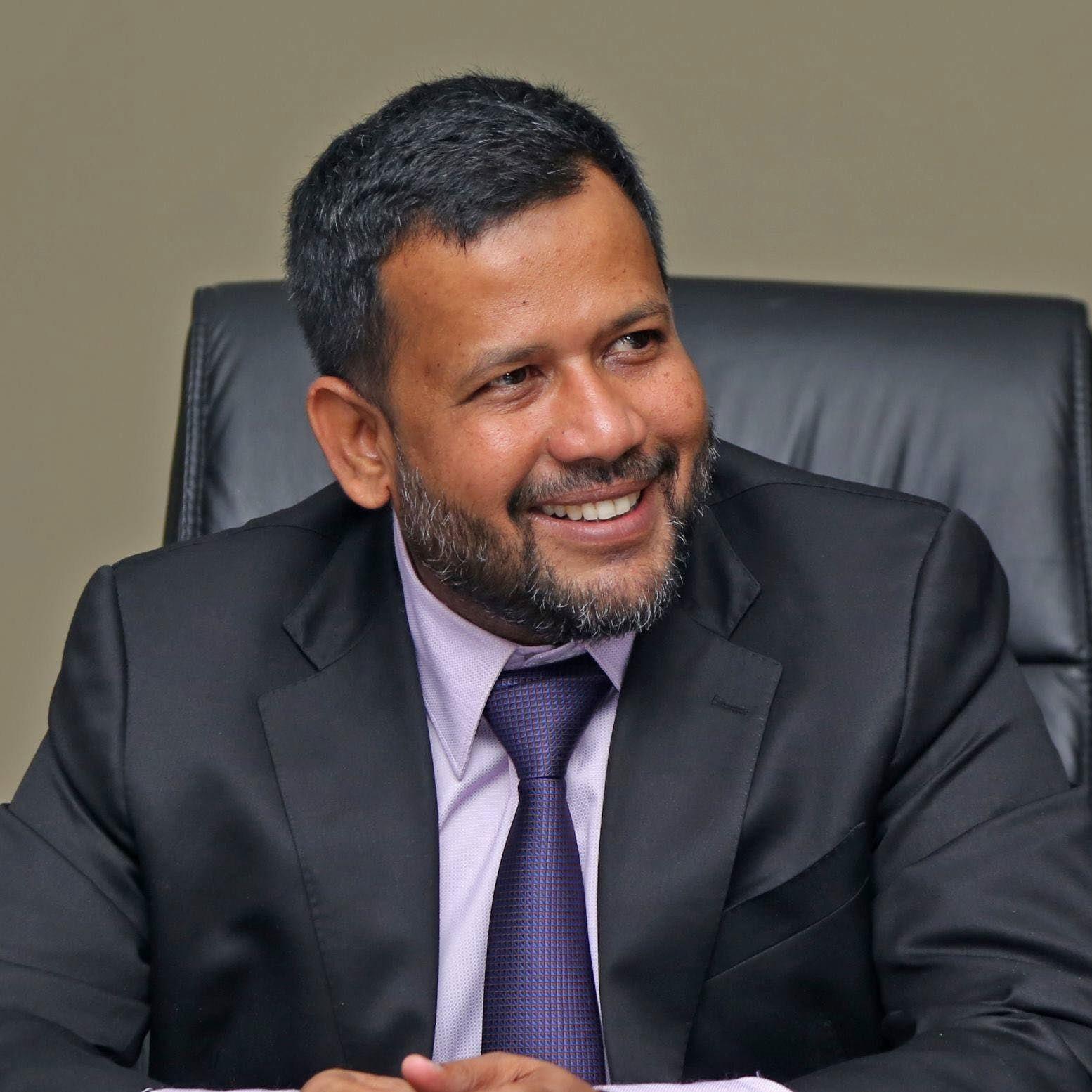
6 minute read
Sri Lanka
from Inter-Parliamentary Union's Decision of the Committee on the Human Rights of Parliamentarians - 170t
Decision adopted by the Committee on the Human Rights of Parliamentarians at its 170th session (Geneva, 21 January to 2 February 2023)
© Courtesy Mr. Rishad Bathiudeen's family
Advertisement
LKA-77 – Rishad Bathiudeen
Alleged human rights violations
Arbitrary arrest and detention
Lack of due process in proceedings against parliamentarians
Violation of freedom of expression and opinion
A. Summary of the case
Mr. Abdul Rishad Bathiudeen, a leading Muslim opposition member, was arrested on 24 April 2021 under the Prevention of Terrorism (Temporary Provisions) Act, No. 48 of 1979, on accusations of having aided and abetted the suicide bombers, allegedly linked to the Islamic State, who caused the deaths of close to 300 people on Easter Sunday, 21 April 2019. The attacks were on churches and hotels and targeted the Christian community in Sri Lanka.
Case LKA-77
Sri Lanka: Parliament affiliated to the IPU
Victim: Male opposition member of parliament
Qualified complainant(s): Section I.1(a) of the Committee Procedure (Annex I)
Submission of complaint: May 2021
Recent IPU decision: November 2021
IPU mission(s): - - -
Recent Committee hearing(s): - - -
Recent follow-up:
- Communication from the authorities: August 2021
- Communication from the complainant: November 2022
-
Communication to the authorities: December 2021
At the time, Mr. Bathiudeen was Minister of Industry and Commerce. One of the entities that came under the purview of his ministry was the Industrial Development Board, which, inter alia, was responsible for selling scrap metal to businesses and for issuing related export licences. It turns out that a company, Colossus (Pvt) Ltd, managed by a director who later became one of the suicide bombers, purchased scrap metal and sought to obtain an export licence from the Industrial Development Board, and that some of the money obtained thereby may have been used to finance the terrorist bombings.
- Communication to the complainant: November 2022
According to the complainant, Mr. Bathiudeen was in no way involved directly in the process of authorizing the sale of scrap metal or the issuance of export licences, these powers having been delegated to others in the ministry. Moreover, the complainant underscored that Mr. Bathiudeen had no relations whatsoever with the director of Colossus (Pvt) Ltd. In this regard, the complainant also points out that, in addition to a ministerial investigation committee, a parliamentary select committee and presidential commission of inquiry found no evidence incriminating Mr. Bathiudeen with regard to the suicide bombings. The complainant states that Mr. Bathiudeen has been targeted with criminal proceedings for his opposition to the then President, Mr. Rajapakse, and owing to anti-Muslim sentiment in the country in the aftermath of the Easter Sunday attacks.
According to the complainant, upon arrest, Mr. Bathiudeen was not shown a warrant, nor was he later charged. Mr. Bathiudeen immediately submitted a Fundamental Rights Application challenging his arrest and detention. According to the Secretary General of Parliament, inasmuch as the matter was of direct concern to parliament, in line with the procedure in place, the Speaker had been informed at the time of Mr. Bathiudeen’s arrest by the competent authorities. Mr. Bathiudeen’s Fundamental Rights Application was before four different Supreme Court judges, with each one deciding to recuse themselves. On 14 October 2021, the Forts Magistrate Court granted Mr. Bathiudeen bail, but still considered him a suspect in the investigation.
On 2 November 2022, Colombo Fort Magistrate’s Court acquitted Mr. Bathiudeen, given that the Attorney General had informed the court that his office had no evidence to constitute charges against him.
B. Decision
The Committee on the Human Rights of parliamentarians
1. Takes note that on 2 November 2022, Colombo Fort Magistrate’s Court acquitted Mr. Bathiudeen, given that the Attorney General had informed the court that his office had no evidence to bring charges against him;
2 Regrets, nevertheless, that Mr. Bathiudeen was detained for six months under the Prevention of Terrorism (Temporary Provisions) Act, No. 48 of 1979, in the absence of the prompt processing of his Fundamental Rights Application and without any information having been made available to show on what concrete factual basis Mr. Bathiudeen was considered a suspect in the investigation, which only gave weight to the statement by the complainant that there was in fact no case against him;
3. Considers that, in light of Mr. Bathiudeen’s acquittal, there are no grounds for any further action in this case; and decides to close any further examination of the case in line with Article 25 of the Annex I to the Revised Rules and Practices of the Committee on the Human Rights of Parliamentarians;
4 Nevertheless calls on the Parliament of Sri Lanka to abolish or amend, as recommended on many occasions by United Nations human rights mechanisms, the Prevention of Terrorism (Temporary Provisions) Act, No. 48 of 1979 and proposes that the IPU offer assistance to that end; recalls in this regard that the Act allows arrests for unspecified “unlawful activities” without warrant and permits detention for up to 18 months without the authorities bringing the suspect before a court, and that this has led to multiple abuses since the adoption of the Act;
5. Requests the Secretary General to convey this decision to the parliamentary authorities and to the complainant.
Geneva, 21 January–2 February 2023
Sri Lanka
Decision adopted by the Committee on the Human Rights of Parliamentarians at its 170th session (Geneva, 21 January to 2 February 2023)
© Ranjan Ramanayake (@RamanayakeR)
LKA-78 – Ranjan Ramanayake
Alleged human rights violations
Threats, acts of intimidation
Inhumane conditions of detention
Lack of fair trial proceedings
Lack of right to appeal
Violation of freedom of opinion or expression
Abusive revocation or suspension of the parliamentary mandate
A. Summary of the case
On 21 January 2021, the Supreme Court sentenced Mr. Ranjan Ramanayake, an opposition member of the Parliament of Sri Lanka, to four years of rigorous imprisonment for contempt of court under Article 105(3) of the Constitution.

Case LKA-78
Sri Lanka: Parliament affiliated to the IPU
Victim: Male opposition member of parliament
Qualified complainant(s): Section I 1(d) of the Committee Procedure (Annex I)
Submission of complaint: August 2021
Recent IPU decision: November 2021
IPU mission(s): - - -
Recent Committee hearing(s): - - -
Recent follow-up:
- Communication from the authorities: Letter from the Attorney General (November 2021)
The Attorney General had brought the case against Mr. Ramanayake following a complaint filed in the Supreme Court by the Venerable Mr. Magalkande Sudantha Thero and retired Air Force officer Mr. Sunil Perera. The case was brought in connection with remarks made by Mr. Ramanayake to the media following a discussion with the then Prime Minister, Mr. Ranil Wickremesinghe, at Temple Trees on 21 August 2017. The interview was broadcast on the “News 1st” news bulletin on MTV Channel (Private) Limited’s Sirasa TV on the same day. During the interview, Mr. Ramanayake stated, inter alia, the following: “The majority of judges in Sri Lanka are corrupt. Corrupt lawyers. About 95 per cent of them. They work for money. Every day they protected murderers, corrupt people and drug dealers for money”.
- Communication from the complainant: August 2022
- Communication to the authorities: October 2021
- Communication to the complainant: August 2022
The complainant states that Mr. Ramanayake’s prison sentence comes in response to his strong opposition to the Government and his efforts to denounce and root out corruption. The complainant considers that Mr. Ramanayake’s sentencing and conviction run counter to his right to freedom of expression, all the more so considering that ample information is available to show the level of corruption in the judiciary, and to his right to participate in the conduct of public affairs, given that his parliamentary mandate was terminated as a result on 7 April 2021. Moreover, the complainant, as well as the United Nations Special Rapporteur on the independence of judges and lawyers, state that in the Sri Lankan legal system "contempt of court " has not been defined clearly, and that the verdict cannot be appealed.
On 26 August 2022, President Ranil Wickremesinghe signed a conditional presidential pardon for Mr. Ramanayake, which subsequently led to his release on the understanding that he would no longer make any statement constituting contempt of court and that he would refrain from acting in a manner that would constitute contempt of court.
B. Decision
The Committee on the Human Rights of Parliamentarians
1. Is very pleased that Mr. Ramanayake was finally released and pardoned;
2. Considers, therefore, that there are no grounds for any further action in this case; and decides to close any further examination of the case in line with Article 25 of the Annex I to the Revised Rules and Practices of the Committee on the Human Rights of Parliamentarians;
3. Nevertheless recalls its previous concerns that Mr. Ramanayake was tried and sentenced on the basis of unclear legal standards and without the possibility of appeal against a hefty prison term for exercising his right to freedom of speech and his parliamentary mandate, which includes oversight of the overall state of administration of justice; recalls its views that both common law jurisprudence and human rights doctrine amply demonstrate that freedom of speech must be the overriding value where contempt of court is concerned; sincerely hopes therefore that the relevant Sri Lankan authorities, including parliament, will take the necessary steps to address the underlying concerns that arose in this case; and proposes that the IPU offer its assistance for this purpose should the Sri Lankan authorities so wish;
4. Requests the Secretary General to convey this decision to the parliamentary authorities and the complainant.







